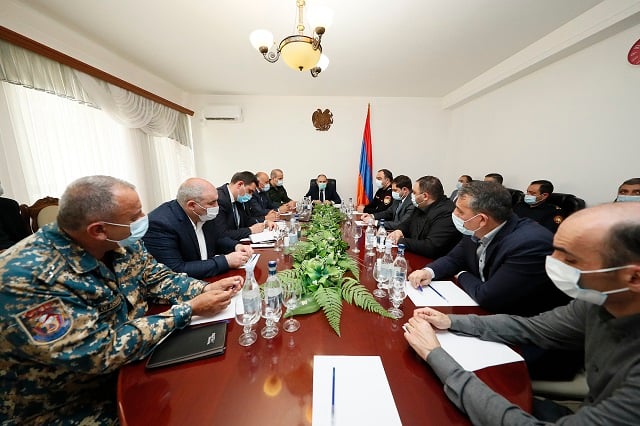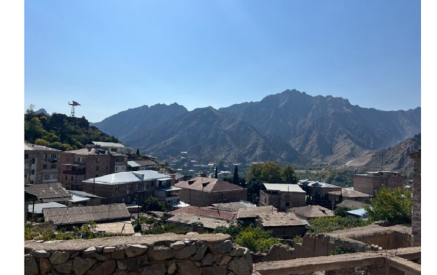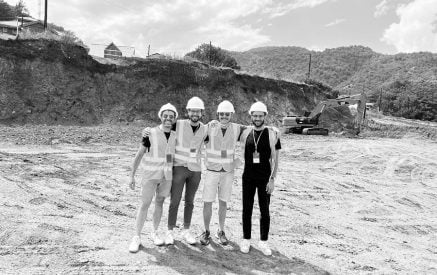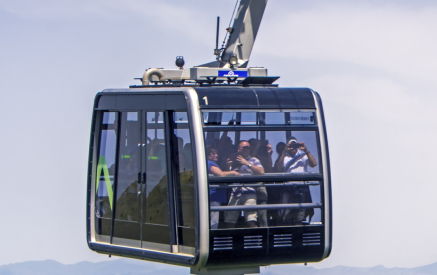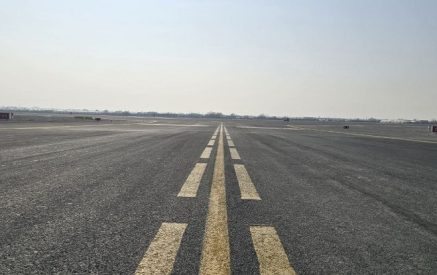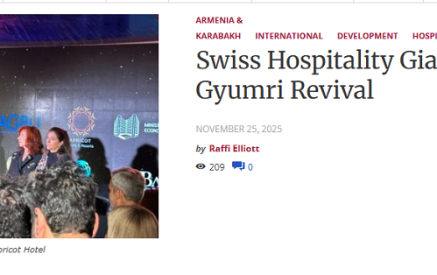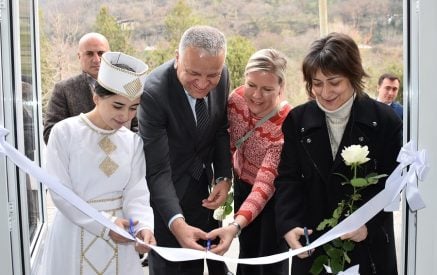A consultation was held in Syunik Marz administration, chaired by Prime Minister Nikol Pashinyan. The meeting was attended by National Security Service Director Armen Abazyan, Minister of Territorial Administration and Infrastructure Suren Papikyan, Chief of Police Vahe Ghazaryan, Syunik Marz Governor Melikset Poghosyan, the deputy governors, Commander of the 4th Army Corps, Major General Artak Budaghyan, Commander of Syunik-stationed Military Unit N Argam Gorgyan, and heads of regional departments of law enforcement agencies.
Addressing the meeting, Prime Minister Pashinyan stated:
“Dear colleagues,
We are holding a regular meeting of a series of regional consultations in Syunik Marz. The security situation around Syunik has changed following the 44-day war, exacerbated by provocative and contradictory statements on the part of Azerbaijan’s leadership.
I wish to draw your attention to the fact that their statements contradict each other. On the one hand, the leadership of Azerbaijan insists that it has no territorial claims or expectations whatsoever regarding Armenia; on the other hand, they declare that they are going to use force to open the so-called Zangezur corridor.
Read also
Earlier today, the Azerbaijani Foreign Ministry had to decry their President’s remarks, stating that he did not mean at all territorial claims against Armenia. Nevertheless, in my opinion, these statements are provocative in nature, they should be given appropriate attention and reaction in the international arena, including from our country’s diplomatic missions.
However, in order not to leave room for further provocations, I would like to emphasize that the statement of November 9 has no mention of Zangezur, Syunik or a corridor. We are actually talking about the opening of regional communications, and we clearly stated in the Moscow statement of January 11 that communication channels ought to be unblocked in the region.
If Azerbaijan talks about the Zangezur corridor, then according to this very logic, Armenia can talk about the Nakhichevan corridor, the North Azerbaijani corridor, since according to the agreements reached and the documents made public, Azerbaijan shall only get a corridor similar to what Armenia can get through the territory of Azerbaijan, including Nakhichevan.
Opening up communications is a completely different task. However, to be honest, my comment is that with such provocative statements, the Azerbaijani leadership simply wants to undermine the process, that is, it wants to step back from the aforementioned agreements, aggravating thereby the situation in the region in order to continue the policy of blockading Armenia.
Whereas I have had no special occasion before, I would also like to talk about Syunik’s border. You may know that unfortunately, the 44-day war did not have the desired outcome for us. And in a situation where our defense capabilities were lacking, it was decided to harmonize the Syunik border with the Collective Security Treaty frontier so that we could deploy collective security systems on that border.
There is a lot of talk about the Armenian-Russian strategic and military-political alliance, and in this connection, I wish to emphasize once again that the Armenian-Russian military-political alliance is extending in its scope: now there is another factor, of course, the factor of the Russian peacekeepers in Nagorno-Karabakh. As to Armenia, the Armenian-Russian military-political alliance applies to the state borders of the Republic of Armenia.
What borders are we talking about? I specifically want to emphasize that the Republic of Armenia has determined and marked the borders – I have already talked about this many times – with the Law on Administrative-Territorial Division of the Republic of Armenia, adopted on May 24, 2010, which defines our country’s administrative borders.
So, what do we read in the annex to this law, what is stated there? Description of the administrative boundaries of Shurnukh rural community in Syunik Marz of the Republic of Armenia: The rural community of Shurnukh is located in the eastern part of Syunik Marz. At section A – B it borders on the state frontier (Republic of Azerbaijan). Next paragraph: Shurnukh – state border (Azerbaijan Republic): A – B. At section A – B, the border line coincides with the state border of the Republic of Armenia and the Republic of Azerbaijan.
Next: description of the administrative boundaries of Vorotan rural community in Syunik Marz of the Republic of Armenia. At section B-D, the border line coincides with the state border between the Republic of Armenia and the Republic of Azerbaijan. I consider it extremely important to state this because by means of its own legislation adopted as early as in 2010 the Republic of Armenia has itself described its borders, or otherwise the territory on which the Collective Security Treaty should act.
I wish to draw your attention to the fact that it was not specified whether the border coincided with the state border of the Republic of Armenia and the Republic of Artsakh; it was written instead that the border coincided with the state border of the Republic of Armenia and Azerbaijan. These are the realities that led to the current status quo. Nevertheless, our task is to ensure higher security level on the borders of the Republic of Armenia, in general, and on the borders of Syunik Marz, in particular.
This issue has two layers: the first is the protection of the state border, and the second is the enhancement of our country’s security level. As we have already agreed and adopted respective decisions, the border security is to be ensured by the border troops of the National Security Service, while the security issues should be handled by our Army and our Armed Forces.
I wish to underscore once again that a large-scale army reform has been launched in the Republic of Armenia and we are implementing it together with the Russian Federation. In implementing this program, we have to take into consideration the realities we faced during the 44-day war.
Yes, we must have a powerful army. We must have an army that will be a worthy ally and the main guarantor of the security and territorial integrity of the Republic of Armenia. No one can prevent the Republic of Armenia from evolving on this path, especially since we have assumed specific commitments in the field of security in the context of our military-political, allied relations, which are of regional importance.
Please note that when we talk about commitments, we mean not only that the allies have assumed obligations towards us, but that we, too, are bound by contractual liabilities, and in this context we should be able to honor our commitments. The army reform should fit into this logic, among other objectives.
It is crucial to underscore that the Government keeps in its focus Syunik’s social and economic problems. You may know that a working group has been set up to deal with Syunik’s issues. The working group has already made decisions, and the first programs are underway: a housing program is being implemented in Shurnukh community. Let me point to another important fact: if I am not mistaken, not a single new house has been built in the village of Chinari in Tavush Marz, or in Shurnukh community of Syunik Marz ever since Armenia’s independence. It is to be regretted indeed that we are launching a housing program in this situation and in this context.
We will continue to implement socioeconomic programs in Syunik, and it is extremely important for us to decide what reforms we should be launched in the mining sector, so that as a state and a nation, the Republic of Armenia, society in the Republic of Armenia could make sure that they can get their own share of the national wealth.
I would also like to touch on the incident that took place today in Meghri. It is obvious that we witnessed a breach of law, and I expect that the law enforcement authorities will respond clearly and drastically, because we cannot allow a small group of people to make an impression, and in general, regardless of impression, we cannot allow an atmosphere of impunity to prevail in the Republic of Armenia.
Mr. Abazyan and Mr. Ghazaryan, you are here now, and I expect that this issue will be resolved through decisive action, and those responsible will be brought to justice.”
The representatives of local units of law enforcement agencies reported that they had collected all media publications related to the incident and forwarded them to the police in order to establish the course of criminal proceedings under Articles 180-181 of the Criminal Code. Criminal proceedings have already been initiated under Part 3 of Art. 258 of the Criminal Code and the relevant materials will be sent to the Investigative Committee in the prescribed manner.
The socioeconomic situation in Syunik Marz was discussed during the meeting. In particular, reference was made to the development of the agricultural sector – pastures, infrastructure, as well as to road construction and large-scale horticultural programs.
The Prime Minister stressed the importance of providing the residents of Syunik with such necessary conditions as may help raise the local population’s living standards. Nikol Pashinyan gave specific instructions to the officials in charge.
INFORMATION AND PUBLIC RELATIONS DEPARTMENT OF THE OFFICE OF THE PRIME-MINISTER OF THE REPUBLIC OF ARMENIA



















































